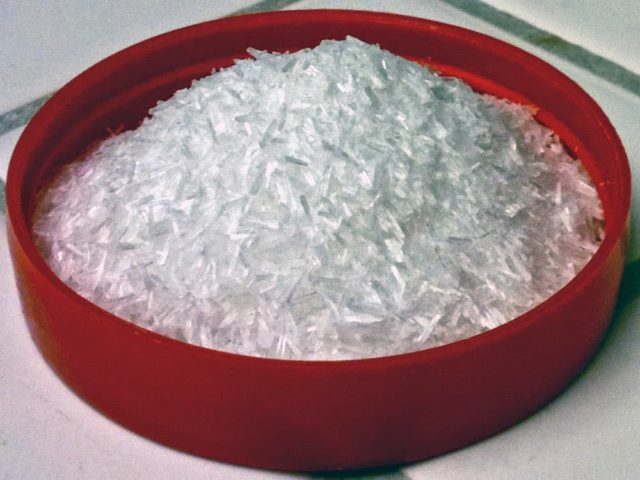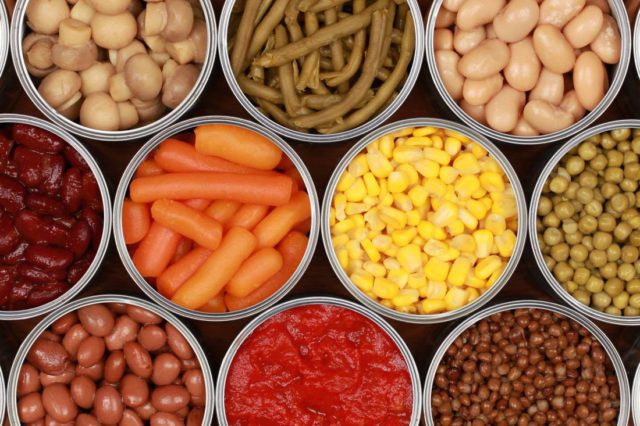Content
E320 food supplement has another name - butylhydroxyanisole. The substance is a mixture of several isomers. It is synthesized from isobutylene (unsaturated carbon) and 4-methoxyphenol. In appearance it is a wax-like dense substance, without a specific odor. It is actively used in the food industry as an antioxidant, and also has preservative properties.
What kind of additive is E320

E320 is a purely artificial food supplement as it does not occur naturally. In appearance, it resembles flakes or crystals of wax of a white, sometimes yellowish tint. Has no taste, very weak phenolic odor. Quite thermally stable, but well soluble in fats, alcohols, ethers. In large volumes, it has a high level of danger.
The food additive has been used since 1947 in fat-containing foods to protect food from oxidation and to preserve color. To achieve the desired effect, rather small doses of the substance are needed. It begins to show its properties when using 0.01% additive per 1 kg of product. The positive characteristics of the food additive include the fact that it is very resistant to high temperatures, therefore it is used in cooking fats, ghee and a number of other food products that are heat-treated.
What is the food additive E320 made of?
The additive contains two substances - 2-tert-butyl-4-hydroxyanisole and the second component - 3-tert-butyl-4-hydroxyanisole. In relation to each other, both substances are isomers.
Thus, E320 is a substance of artificial origin, which is synthesized in special laboratories. Among the domestic manufacturers of food additives, it is worth noting a company from St. Petersburg, which uses only high-quality raw materials from foreign suppliers in its work. However, more often in Russia and Ukraine, they use an additive from Chinese manufacturers, which is manufactured in Shanghai by Honghao. Also, the company Merck KGaA from the Netherlands has long established itself, which has been producing high quality chemical raw materials for many years.
E320 is packed in high-strength polyethylene bags, which are intended exclusively for food use. Next, the bags are placed in multi-layer cardboard boxes. The maximum container volume is 25 kg. Small batches up to 1 kg are packed in strong foil and sealed tightly.
The benefits and harms of food additives E320

The harm from the use of butylhydroxyanisole in food has not been fully proven. However, many experts are sure that E320 is a carcinogen and is capable of exposing cells to various mutations, especially when interacting with nitrates. In view of this, many countries have banned the use of this food additive in their industries at the legislative level. There are also a number of scientists who are sure that with the normalized use of the substance E320, the additive is absolutely safe for the human body.
Consuming a lot of preservative can lead to the following health problems:
- violation of the kidneys, liver;
- inflammatory processes in the stomach and intestines;
- rash, eczema on the skin;
- allergic reactions;
- increased blood cholesterol levels.
It is worth noting that the benefits to the body from the E320 supplement have not been established, since the substance is of synthetic origin.
E320 food additive is dangerous or not
The effect of the food additive E320 on the human body has not been fully established. One thing is known for sure that there are certain contraindications to the use of this substance. It is not recommended to use the supplement in food for pregnant and lactating women, as well as for women planning a baby. This component is contraindicated in children and adolescents. Experts strongly advise against using the food supplement for patients with a history of cardiovascular pathologies.
Women who are susceptible to allergic reactions on the skin, suffering from certain diseases of the dermis, should be careful when choosing cosmetics if they contain E320.
Where and why is the food additive E320 added?

Since the E320 additive has high antioxidant and antimicrobial properties, it is actively used in various fields of human activity.
As a preservative, the component is used in the following food products:
- various oils for culinary use;
- canned fish and meat;
- beer;
- potato chips;
- cocoa and chocolate;
- some confectionery;
- fast food products;
- chewing gum;
- processed cheeses;
- bakery products.
Other areas of application of the E320 food additive include pharmacology, animal husbandry, where the substance is used as a preservative in feed; cosmetology, some areas of the chemical industry.
Conclusion
The food additive E320 is of synthetic origin. In this regard, the benefits of the substance for the body have not been established. The alleged harm has also not been fully proven and disputes between experts on this topic have not subsided to this day. Despite this, in Russia, the additive is allowed to be used in the food industry, cosmetology and pharmacology.

